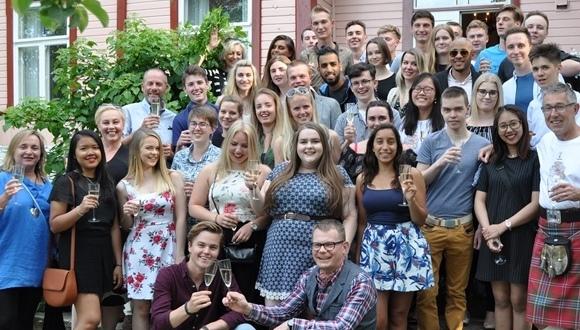We are a multidisciplinary team from Glasgow Caledonian University, Lahti University of Applied Science in Finland, The Hague University of Applied Science and industry collaborator, Constructionarium (Scotland) Ltd.
Our 2019 CATE-winning project is PEETS - a multidisciplinary, intercultural and international mobility initiative which stands for Promoting Excellence in Employability and Transversal Skills – (skills that are readily transferable and flexible).
It involves around 50 students and staff from different disciplines and three European universities working together on an annual project to develop their own employability skills through a number of industry informed activities.
I would like to share some of the ‘key tips’ we used in preparing our CATE application which may help support your own future applications.
Plan your approach carefully
Our project already had evaluation built in at various stages including student, staff and independent external evaluators. What we will now do for all similar projects/initiatives is prospectively try to more fully identify the impacts, their linkages and through that any ways in which they can be further enhanced.
Don’t be afraid to ask
Internally, there are key resources that should be accessed. For example, our Head of Academic Development and her team were essential in providing constructive feedback on our numerous drafts, but also helping us consider the ‘searching questions’.
Externally, there is a growing community keen to share their own experience. For example, I phoned up a couple of previous recipients of CATE – people I had not previously known - who were generous with their time and advice.
As an institution new to the submission process, we also consulted Professor Peter Hartley, a National Teaching Fellow 2000, who was excellent with his analysis, insight and advice.
If at first you don’t succeed…
Although we were fortunate enough to be successful at our first attempt for CATE, when we initially applied for Erasmus+ funding to the EU, we were unsuccessful. So we reflected on our submission and used the feedback to enhance our subsequent application which was successful.
Bob is a Professor of Learning and Teaching with a PhD in Public Health Engineering and more than 20 years’ experience in academia including leading a Programme Leader and Research Centre. As Principal Investigator of the PEETS Erasmus+ Strategic Partnership, his focus now is the development of employability attributes for students.

Applications for CATE 2020 are open now for teams to demonstrate the key role that teamwork plays in enhancing teaching and learning through collaborative approaches in higher education.
Applications close on Wednesday 11 March 2020. Find out more.